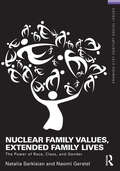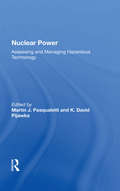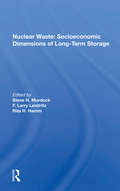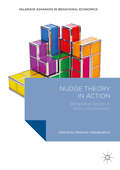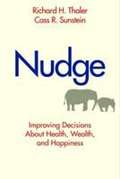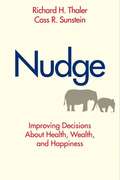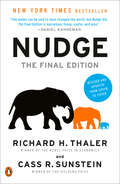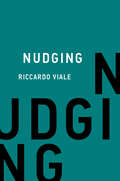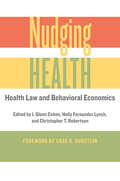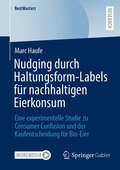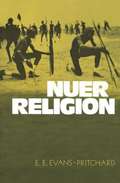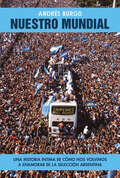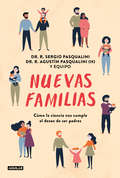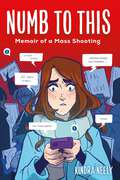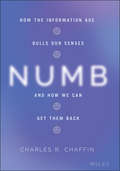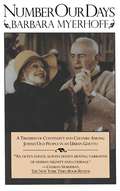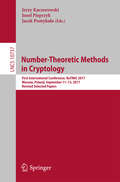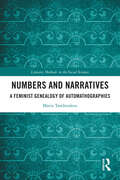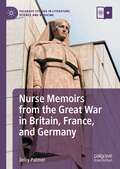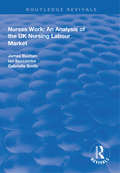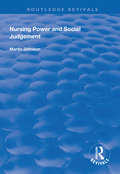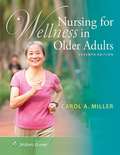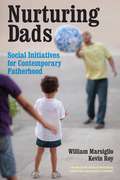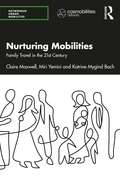- Table View
- List View
Nuclear Family Values, Extended Family Lives: The Power of Race, Class, and Gender (Framing 21st Century Social Issues)
by Naomi Gerstel Natalia SarkisianNuclear Family Values, Extended Family Lives shows how the current emphasis on the nuclear family – with its exclusion of the extended family – is narrow, even deleterious, and misses much of family life. This omission is tied to gender, race, and class. This book is broken down into six chapters. Chapter one discusses how, when promoting "family values" and talking about "family as the basic unit of American society," social commentators, politicians, and social scientists alike typically ignore extended kin ties and focus only on the nuclear family. Chapters two and three show that the focus on marriage and the nuclear family is a narrow view that ignores the familial practices and experiences of many Americans – particularly those of women who do much of the work of maintaining kin ties and racial/ethnic minorities for whom extended kin are centrally important. Chapter four focuses on class and economic inequality and explores how an emphasis on the nuclear family may actually promulgate a vision of family life that dismisses the very social resources and community ties that are critical to the survival strategies of those in need. In chapter five, the authors argue that marriage actually detracts from social integration and ties to broader communities. Finally, in chapter six, the authors suggest that the focus on marriage and the nuclear family and the inattention to the extended family distort and reduce the power of social policy in the United States.
Nuclear Power: Assessing And Managing Hazardous Technology
by Martin J PasqualettiAddressing the major issues surrounding the use of nuclear power, twenty-nine social scientists with extensive involvement in the assessment and management of nuclear technology discuss critical areas of concern--problem recognition, risk estimation, and policy formation and implementation. The authors appraise fundamental policy issues and examine
Nuclear Waste: Socioeconomic Dimensions Of Long-term Storage
by Steve H. Murdock F. Larry Leistritz Rita R. HammCritical in solving the nuclear waste problem are such issues as the techniques needed to equitably select waste repository sites; the implications for economies, populations, public services, social structures, and future generations in siting areas; the best means for mitigating short- and long-term public and private impact of repositories; and the type of citizen involvement that best ensures the full participation of national, state, and local interest groups in the siting process. The contributors to this book examine these and related issues, offering the perspectives of sociology, economics, philosophy, and political science and representing the differing views of various regions of the nation.
Nudge Theory in Action
by Sherzod AbdukadirovThis collection challenges the popular but abstract concept of nudging, demonstrating the real-world application of behavioral economics in policy-making and technology. Groundbreaking and practical, it considers the existing political incentives and regulatory institutions that shape the environment in which behavioral policy-making occurs, as well as alternatives to government nudges already provided by the market. The contributions discuss the use of regulations and technology to help consumers overcome their behavioral biases and make better choices, considering the ethical questions of government and market nudges and the uncertainty inherent in designing effective nudges. Four case studies - on weight loss, energy efficiency, consumer finance, and health care - put the discussion of the efficiency of nudges into concrete, recognizable terms. A must-read for researchers studying the public policy applications of behavioral economics, this book will also appeal to practicing lawmakers and regulators.
Nudge: Improving Decisions About Health, Wealth, And Happiness
by Cass R. Sunstein Richard H. ThalerEvery day, we make decisions on topics ranging from personal investments to schools for our children to the meals we eat to the causes we champion. Unfortunately, we often choose poorly. The reason, the authors explain, is that, being human, we all are susceptible to various biases that can lead us to blunder. Our mistakes make us poorer and less healthy; we often make bad decisions involving education, personal finance, health care, mortgages and credit cards, the family, and even the planet itself. Thaler and Sunstein invite us to enter an alternative world, one that takes our humanness as a given. They show that by knowing how people think, we can design choice environments that make it easier for people to choose what is best for themselves, their families, and their society. Using colorful examples from the most important aspects of life, Thaler and Sunstein demonstrate how thoughtful "choice architecture" can be established to nudge us in beneficial directions without restricting freedom of choice.
Nudge: Improving Decisions About Health, Wealth, and Happiness
by Cass R. Sunstein Richard H. ThalerEvery day, we make decisions on topics ranging from personal investments to schools for our children to the meals we eat to the causes we champion. Unfortunately, we often choose poorly. The reason, the authors explain, is that, being human, we all are susceptible to various biases that can lead us to blunder. Our mistakes make us poorer and less healthy; we often make bad decisions involving education, personal finance, health care, mortgages and credit cards, the family, and even the planet itself. Thaler and Sunstein invite the listener to enter an alternative world, one that takes our humanness as a given. They show that by knowing how people think, we can design choice environments that make it easier for people to choose what is best for themselves, their families, and their society. Using colorful examples from the most important aspects of life, Thaler and Sunstein demonstrate how thoughtful "choice architecture" can be established to nudge us in beneficial directions without restricting freedom of choice. Nudgeoffers a unique new take-from neither the left nor the right-on many hot-button issues, for individuals and governments alike. This is one of the most engaging and provocative audio books to come along in many years.
Nudge: The Final Edition (Routledge Advances In Behavioural Economics And Finance Ser.)
by Cass R. Sunstein Richard H. ThalerAn essential new edition―revised and updated from cover to cover―of one of the most important books of the last two decades, by Nobel Prize winner Richard H. Thaler and Cass R. Sunstein* More than 2 million copies sold* New York Times bestsellerSince the original publication of Nudge more than a decade ago, the title has entered the vocabulary of businesspeople, policy makers, engaged citizens, and consumers everywhere. The book has given rise to more than 400 &“nudge units&” in governments around the world and countless groups of behavioral scientists in every part of the economy. It has taught us how to use thoughtful &“choice architecture&”—a concept the authors invented—to help us make better decisions for ourselves, our families, and our society.Now, the authors have rewritten the book from cover to cover, making use of their experiences in and out of government over the past dozen years as well as an explosion of new research in numerous academic disciplines. To commit themselves to never undertaking this daunting task again, they are calling this the &“final edition.&” It offers a wealth of new insights, for both its avowed fans and newcomers to the field, about a wide variety of issues that we face in our daily lives—COVID-19, health, personal finance, retirement savings, credit card debt, home mortgages, medical care, organ donation, climate change, and &“sludge&” (paperwork and other nuisances we don&’t want, and that keep us from getting what we do want)—all while honoring one of the cardinal rules of nudging: make it fun!
Nudging
by Riccardo VialeHow &“nudges&” by government can empower citizens without manipulating their preferences or exploiting their biases.We&’re all familiar with the idea of &“nudging&”—using behavioral mechanisms to encourage people to make certain choices—popularized by Richard Thaler and Cass Sunstein in their bestselling 2008 book Nudge. This approach, also known as &“libertarian paternalism,&” goes beyond typical programs that simply provide information and incentives; nudges can range from automatic enrollment in a pension plan to flu-shot scheduling. In Nudging, Riccardo Viale explores the evolution of nudging and proposes new approaches that would empower citizens without manipulating them paternalistically. He shows that we can use the tools of the behavioral sciences without abandoning the principle of conscious decision-making. Viale discusses the work of Herbert Simon, Gerd Gigerenzer, Daniel Kahneman, and Amos Tversky that laid the foundation of behavioral economics, describes how policy makers have sought to help people avoid bad decisions, offers examples of effective nudging, and considers how to nudge the nudgers. How can we tell good nudges from bad nudges? Viale explains that good nudges help us avoid bias and encourage deliberate decision making; bad nudges, on the other hand, use bias to nudge people unconsciously into unintentional behaviors. Bad nudges attempt to compel decisions based on economic rationality. Good nudges encourage decisions based on a pragmatic, adaptive, ecological kind of rationality. Policy makers should take note.
Nudging Health: Health Law and Behavioral Economics
by I. Glenn Cohen, Holly Fernandez Lynch, and Christopher T. RobertsonA deep look at the role of behavioral "nudges" for improving health.Winner of the CHOICE Outstanding Academic Title of the Choice ACRLBehavioral nudges are everywhere: calorie counts on menus, automated text reminders to encourage medication adherence, a reminder bell when a driver’s seatbelt isn’t fastened. Designed to help people make better health choices, these reminders have become so commonplace that they often go unnoticed. In Nudging Health, forty-five experts in behavioral science and health policy from across academia, government, and private industry come together to explore whether and how these tools are effective in improving health outcomes.Behavioral science has swept the fields of economics and law through the study of nudges, cognitive biases, and decisional heuristics—but it has only recently begun to impact the conversation on health care. Nudging Health wrestles with some of the thorny philosophical issues, legal limits, and conceptual questions raised by behavioral science as applied to health law and policy. The volume frames the fundamental issues surrounding health nudges by addressing ethical questions. Does cost-sharing for health expenditures cause patients to make poor decisions? Is it right to make it difficult for people to opt out of having their organs harvested for donation when they die? Are behavioral nudges paternalistic? The contributors examine specific applications of behavioral science, including efforts to address health care costs, improve vaccination rates, and encourage better decision-making by physicians. They wrestle with questions regarding the doctor-patient relationship and defaults in healthcare while engaging with larger, timely questions of healthcare reform.Nudging Health is the first multi-voiced assessment of behavioral economics and health law to span such a wide array of issues—from the Affordable Care Act to prescription drugs.Contributors: David A. Asch, Jerry Avorn, Jennifer Blumenthal-Barby, Alexander M. Capron, Niteesh K. Choudhry, I. Glenn Cohen, Sarah Conly, Gregory Curfman, Khaled El Emam, Barbara J. Evans, Nir Eyal, Andrea Freeman, Alan M. Garber, Jonathan Gingerich, Michael Hallsworth, Jim Hawkins, David Huffman, David A. Hyman, Julika Kaplan, Aaron S. Kesselheim, Nina A. Kohn, Russell Korobkin, Jeffrey T. Kullgren, Matthew J.B. Lawrence, George Loewenstein, Holly Fernandez Lynch, Ester Moher, Abigail R. Moncrieff, David Orentlicher, Manisha Padi, Christopher T. Robertson, Ameet Sarpatwari, Aditi P. Sen, Neel Shah, Zainab Shipchandler, Anna D. Sinaiko, Donna Spruijt-Metz, Cass R. Sunstein, Thomas S. Ulen, Kristen Underhill, Kevin G. Volpp, Mark D. White, David V. Yokum, Jennifer L. Zamzow, Richard J. Zeckhauser
Nudging durch Haltungsform-Labels für nachhaltigen Eierkonsum: Eine experimentelle Studie zu Consumer Confusion und der Kaufentscheidung für Bio-Eier (BestMasters)
by Marc HaufeMehrstufige Labels, wie sie auf Fleisch- und Milchprodukten zu finden sind, sollen die Transparenz und Sichtbarkeit nachhaltiger Lebensmittel verbessern, auf Eierpackungen fehlt jedoch aktuell ein solches Label. In dieser Studie wird untersucht, welchen Einfluss die Einführung eines Haltungsform-Labels für Legehennen auf die Label Confusion und die Zahlungs- und Kaufbereitschaft für Bio-Eier hat. Dazu wurde ein Online-Experiment mit 257 Teilnehmern durchgeführt. Verglichen wurde die aktuelle Tierhaltungskennzeichnung bei Eiern mittels Schriftzug, mit einem Haltungsform-Label analog dem für Fleischprodukte sowie einem optimierten Label, das die Anzahl der Tiere pro Fläche visualisiert. In Anbetracht der Ergebnisse sollte über die Einführung einer optimierten Version des mehrstufigen Haltungsform-Labels auf Eierverpackungen nachgedacht werden. Die Studie liefert neue Erkenntnisse für die Labelforschung bei Lebensmitteln, insbesondere bzgl. der Kaufbereitschaft für Bio-Eier.
Nuer Religion
by E. E. Evans-PritchardThe late Edward E. Evans Pritchard was a Professor of Social Anthropology at the University of Oxford. This is a study of Nuer religion, a study of what they consider to be the nature of Spirit and of man's relation to it. <p><i> Bookshare Proofer’s note: Page numbers in this book are offset by 15. For page 10 in the table of contents, please go to page 25 for example. </i>
Nuestro Mundial: Una historia íntima de cómo nos volvimos a enamorar de la selección argentina
by Andrés BurgoUna crónica pasional sobre Qatar 2022: el mundial que se jugó allá pero se sufrió y festejó acá; en Argentina. Un ensayo sobre por qué esta vez; con la Selección comandada por Scaloni y capitaneada por Messi; el fútbol nos sacudió a todos; futboleros y no futboleros; y cómo legó a las nuevas generaciones un relato épico propio. Y un testimonio de la abrumadora imagen de los cinco millones que el 20 de diciembre salieron a las calles de todo el país a compartir su felicidad. Una crónica callejera de la Copa que se ganó en Qatar y se vivió acá. Si el fútbol siempre exagera la vida y los Mundiales exageran el fútbol, Qatar exageró la vida y el fútbol. ¿Cuántos sintieron -como dijo Messi- que diciembre de 2022 fue el Mes de Nuestras Vidas? Esta Copa del Mundo nos sacudió a todos y a todas, a los futboleros de ley y a los que se suman cada cuatro años, pero en particular a las nuevas generaciones, desde los más pibes a los de 30, que primero agotaron las figuritas y luego tuvieron, por fin, su propia leyenda, su propia épica, su propio héroe. Fue un Mundial del que cada uno guardará un recuerdo personal, único. No solo las imágenes lacradas en eternidad (Messi y la Copa, el baile del Dibu, "qué mirá' bobo, andá p'allá") sino, y especialmente, una postal íntima: la de dónde y con quiénes lo sufrimos y lo festejamos. Una foto de los días en que el tiempo quedó suspendido y millones nos enajenamos por la Scaloneta y salimos a la calle en un escenario que fue también atípico, al borde del verano, en un mes que nuestra historia asocia a situaciones mucho menos felices. Por todo eso, este no es un libro de análisis deportivo, es una crónica pasional sobre el evento que nos convocó y unió como pocas veces. Que reconstruye la relación de los hinchas con la Selección, sí, pero que por encima de todo deja testimonio del delirio que vivimos con amigos, del regreso a una infancia en la que los goles eran el centro de la Tierra y de esos abrazos -que ya no abundan- entre padres, madres, hijos e hijas. Un relato vital y emotivo de cómo, cuando ya no lo esperábamos, atravesamos nuestro Mundial más hermoso y volvimos a ser hinchas del Club Atlético Selección Argentina.
Nuevas familias: Cómo la ciencia nos cumple el deseo de ser padres
by Dr. R. Sergio Pasqualini Dr. R. Agustín PasqualiniLos doctores Sergio y Agustin Pasqualini, referentes de reconocimiento internacional en Medicina Reproductiva, junto a un equipo interdisciplinario, presentan historias en las que diferentes personas dan cuenta del camino y las decisiones que tomaron a medida que avanzaban en las distintas maneras de concebir un hijo. Durante muchos años consideramos que una familia estaba conformada por una mamá, un papá e hijos. Pero ese modelo ya no es el único. A lo largo de los años, los avances de la ciencia permitieron a diferentes personas concretar su deseo de tener un hijo: mujeres solas, hombres solos, parejas de varones, parejas de mujeres, parejas con problemas de fertilidad, mujeres que ya dejaron de ovular por edad o por una enfermedad preexistente y cualquier persona con alguna dificultad para concebir. También se abrieron puertas que generan debates, como la gestación por sustitución o la adopción de embriones. Los doctores Sergio y Agustin Pasqualini, referentes de reconocimiento internacional en Medicina Reproductiva, junto al equipo interdisciplinario de Halitus Instituto Médico, presentan historias en las que diferentes personas dan cuenta del camino y las decisiones que tomaron a medida que avanzaban en las distintas maneras de concebir un hijo. "Porque en verdad -dicen los autores- este libro se trata de un deseo. Uno solo. Y vital. Es lo que nosotros llamamos deseo procreacional, que es la base, el primer paso, el primer ladrillo, el indispensable para ser mamás y/o ser papás".
Numb to This: Memoir of a Mass Shooting
by Kindra NeelyThis searing graphic memoir portrays the impact of gun violence through a fresh lens with urgency, humanity, and a very personal hope. Kindra Neely never expected it to happen to her. No one does. Sure, she&’d sometimes been close to gun violence, like when the house down the street from her childhood home in Texas was targeted in a drive-by shooting. But now she lived in Oregon, where she spent her time swimming in rivers with friends or attending classes at the bucolic Umpqua Community College. And then, one day, it happend: a mass shooting shattered her college campus. Over the span of a few minutes, on October 1, 2015, eight students and a professor lost their lives. And suddenly, Kindra became a survivor. This empathetic and ultimately hopeful graphic memoir recounts Kindra&’s journey forward from those few minutes that changed everything. It wasn&’t easy. Every time Kindra took a step toward peace and wholeness, a new mass shooting devastated her again. Las Vegas. Parkland. She was hopeless at times, feeling as if no one was listening. Not even at the worldwide demonstration March for Our Lives. But finally, Kindra learned that—for her—the path toward hope wound through art, helping others, and sharing her story.
Numb: How the Information Age Dulls Our Senses and How We Can Get them Back
by Charles R. ChaffinDiscover how to manage this noisy world without it managing you. In Numb, distinguished author Dr. Charles R. Chaffin delivers a fun and evidence-based exploration of how you can devote more attention on what you believe is important while ignoring the distractions that increasingly permeate your life. Using research from cognitive, education, positive, and clinical psychology, the book identifies the sources of noise and distraction in this information age and how we can manage it in all aspects of our lives. You'll learn about: How experiences in technology, from social media to selfies to porn, impact our ability to engage and connect with others The news we consume and the impact of confirmation bias, filter bubbles, and tribalism How FOMO and choice overload impact our decision-making The power of our attention in all aspects of our daily lives Perfect for anyone interested in the expanding impact of the information age on our collective psyche, ;Numb helps empower you to use technology and information not as a destination, but as a tool towards authenticity and empowerment.
Number Our Days
by Barbara MyerhoffWhen noted anthropologist Barbara Myerhoff received a grant to explore the process of aging, she decided to study some elderly Jews from Venice, California, rather than to report on a more "exotic" people. The story of the rituals and lives of these remarkable old people is, as Bel Kaufman said, "one of those rare books that leave the reader somehow changed." Here Dr. Myerhoff records the stories of a culture that seems to give people the strength to face enormous daily problems -- poverty, neglect, loneliness, poor health, inadequate housing and physical danger. The tale is a poignant one, funny and often wise, with implications for all of us about the importance of ritual, the agonies of aging, and the indomitable human spirit.
Number-Theoretic Methods in Cryptology: First International Conference, Nutmic 2017, Warsaw, Poland, September 11-13, 2017, Revised Selected Papers (Lecture Notes in Computer Science #10737)
by Josef Pieprzyk Jerzy Kaczorowski Jacek PomykałaThis book constitutes the refereed post-conference proceedings of the First International Conference on Number-Theoretic Methods in Cryptology, NuTMiC 2017, held in Warsaw, Poland, in September 2017.The 15 revised full papers presented in this book together with 3 invited talks were carefully reviewed and selected from 32 initial submissions. The papers are organized in topical sections on elliptic curves in cryptography; public-key cryptography; lattices in cryptography; number theory; pseudorandomness; and algebraic structures and analysis.
Numbers and Narratives: A Feminist Genealogy of Automathographies (Literary Methods in the Social Sciences)
by Maria TamboukouWhy have there been so few women mathematicians? This book does not seek an answer in absence but in the forces, ruptures, and intensities that shape the becoming of a femme philosophe—a mathematician, scientist, and philosopher—within the shifting assemblages of eighteenth- and nineteenth-century Europe. Moving beyond exclusion as mere negation, it traces the conditions of emergence, the differential speeds and slippages through which women entered, inhabited, and transformed the mathematical sciences.Drawing on auto/biographical documents, literary and philosophical writings, and the materialities of the archive, this book approaches the digital turn not as a tool but as a plane of composition, where new trajectories of memory work unfold. Between historiography and fabulation, it maps a space where women’s mathematical thought was not only possible but inevitable—if only in flashes, excesses, and détours.This book will resonate with scholars in the sociology, history, and philosophy of science and mathematics, particularly those engaged with feminist thought, the politics of knowledge, and experimental archival methods.
Nurse Memoirs from the Great War in Britain, France, and Germany (Palgrave Studies in Literature, Science and Medicine)
by Jerry PalmerNurse Memoirs from the Great War in Britain, France, and Germany examines an understudied corpus of memoirs in English, French, and German stemming from the unprecedented involvement of women in the war effort. Jerry Palmer considers the memoirs in relationship to public opinion, collective memory and other women’s writing about the war. Through close-readings of the memoirs and their contexts, the book identifies themes present in the texts and considers the nurse memoir as rhetoric—examining to what extent the texts are promoting or countering arguments in the public sphere about their involvement or more widely about women’s position in society. Palmer explores the multiple contexts related to the nurse memoirs, including public response to volunteer wartime nursing, the organisation of the military health services of the three nations and their conduct in the war, and changes in the post-war organization of public health services and the professionalization of nursing.
Nurses Work: An Analysis of the UK Nursing Labour Market (Routledge Revivals)
by James Buchan Ian SeccombeFirst published in 1998, this volume emerged in the context of rapidly developing nursing and health care fields and features contributions on areas in the NHS and private nursing including nurses’ pay and education, the gender balance in the nursing labour market, working patterns, employment contracts and turnover. It is part of a series of monographs offers up-to-date reports of recently completed research projects in the fields of nursing and health care. The aim of the series is to report studies that have relevance to contemporary nursing and health care practice. It includes reports of research into aspects of clinical nursing care, management and education. The series is of interest to all nurses and health care workers, researchers, managers and educators in the field.
Nursing Power and Social Judgement: An Interpretive Ethnography of a Hospital Ward (Routledge Revivals)
by Martin JohnsonFirst published in 1997, this work makes a substantial reexamination of the social processes behind the labelling of patients in hospital care. Taking an interpretive perspective, the author analyzes the social construction of patient labels identifying strategies for and the consequences of giving and receipt of 'good' and 'bad' labels. He shows how the rich data of truly participant observation in the tradition of reflexive ethnography can powerfully illuminate the experiences and actions of both patients and their nurses. It is a critical analysis of key work in this field. Professor Johnson demonstrates the redundancy of trait theories of social judgment, offering a more complex and negotiated reality in which patient labels form a part of a rich web of unequal power relations between nurses and their clients.
Nursing for Wellness in Older Adults (Seventh Edition)
by Carol A. MillerThis 7th edition of Nursing for Wellness in Older Adults prepares your students to provide effective, wellness-oriented nursing care for older adults in any healthcare setting. The book provides comprehensive, easy-to-understand coverage of the theory and practice of gerontological nursing, addressing both physiologic and psychosocial aspects of aging, as well as broader issues such as cultural competence and legal and ethical concerns.
Nursing the Spirit: Care, Public Life, and the Dignity of Vulnerable Strangers
by Don GrantIllness and death have always raised profound spiritual concerns. However, today most people experience suffering and treatment in hospitals and other impersonal, bureaucratic facilities whose employees are expected to follow scientific, rationalized norms of behavior. How do professional caregivers—the nurses and other workers who tend to patients—navigate between science and spirituality?Don Grant investigates the subtle ways that nurses at an academic medical center incorporate spirituality into their care work. Based on extensive fieldwork and an in-depth survey on spirituality, this book finds that many nurses see themselves as responsible for not only patients’ physical health but also their spiritual well-being. They believe they are able to reconcile science and spirituality through storytelling and claim that they can provide more spiritual care than chaplains. However, nurses rarely talk about religion among themselves because they are concerned that their colleagues are uncomfortable discussing spirituality. Nevertheless, by seeking to honor patients’ ultimate worth as human beings, many nurses are able to instantiate spiritual values of care.Grant interweaves his experiences as a hospital volunteer chaplain and a living liver-transplant donor with empirical analyses of nurses’ spiritual work. Developing a new understanding of the social significance of religion, Nursing the Spirit recasts the intersection of science and spirituality by centering the perspectives of the people who provide care.
Nurturing Dads: Fatherhood Initiatives Beyond the Wallet
by Kevin Roy William MarsiglioAmerican fathers are a highly diverse group, but the breadwinning, live-in, biological dad prevails as the fatherhood ideal. Consequently, policymakers continue to emphasize marriage and residency over initiatives that might help foster healthy father-child relationships and creative co-parenting regardless of marital or residential status. In Nurturing Dads, William Marsiglio and Kevin Roy explore the ways new initiatives can address the social, cultural, and economic challenges men face in contemporary families and foster more meaningful engagement between many different kinds of fathers and their children. What makes a good father? The firsthand accounts in Nurturing Dads show that the answer to this question varies widely and in ways that counter the mainstream "provide and reside" model of fatherhood. Marsiglio and Roy document the personal experiences of more than 300 men from a wide range of socioeconomic backgrounds and diverse settings, including fathers-to-be, young adult fathers, middle-class dads, stepfathers, men with multiple children in separate families, and fathers in correctional facilities. They find that most dads express the desire to have strong, close relationships with their children and to develop the nurturing skills to maintain these bonds. But they also find that disadvantaged fathers, including young dads and those in constrained financial and personal circumstances, confront myriad structural obstacles, such as poverty, inadequate education, and poor job opportunities. Nurturing Dads asserts that society should help fathers become more committed and attentive caregivers and that federal and state agencies, work sites, grassroots advocacy groups, and the media all have roles to play. Recent efforts to introduce state-initiated paternity leave should be coupled with social programs that encourage fathers to develop unconditional commitments to children, to co-parent with mothers, to establish partnerships with their children's other caregivers, and to develop parenting skills and resources before becoming fathers via activities like volunteering and mentoring kids. Ultimately, Marsiglio and Roy argue, such combined strategies would not only change the policy landscape to promote engaged fathering but also change the cultural landscape to view nurturance as a fundamental aspect of good fathering. Care is a human experience—not just a woman's responsibility—and this core idea behind Nurturing Dads holds important implications for how society supports its families and defines manhood. The book promotes the progressive notion that fathers should provide more than financial support and, in the process, bring about a better start in life for their children. A Volume in the American Sociological Association's Rose Series in Sociology
Nurturing Mobilities: Family Travel in the 21st Century (Networked Urban Mobilities)
by Claire Maxwell Miri Yemini Katrine Mygind BachNurturing Mobilities employs new empirical material and an innovative theoretical framing to bring new clarity to why families travel today – and what happens when they do. The authors argue that an imperative to ‘think with mobility’ and to ‘aspire to be mobile’ shapes identities, futures, and family practices. Drawing on data that examines family travel practices – typically short-term trips – across the working-, middle-, and globally mobile middle-classes, Nurturing Mobilities describes how families travel, why they travel, and the role young family members play in curating family travel. Vitally, it examines the two biggest contemporary issues in global mobility: COVID-19, and climate change. How has COVID-19 changed travel motivations in a world beset by lockdowns and diminished finances? How are concerns around climate change, and engagements with global citizenship education, changing family travel practices? Nurturing Mobilities illuminates new ways in which social class divergence is forged through movements across borders. The authors’ theoretically inter-disciplinary approach delivers a full analysis of the apparently divergent processes that differentiate family travel along social class lines, yet also allow travel to play a core role in social mobility. This book is a vital resource for scholars and students studying mobility, globalisation, social class, and climate change engagement.
